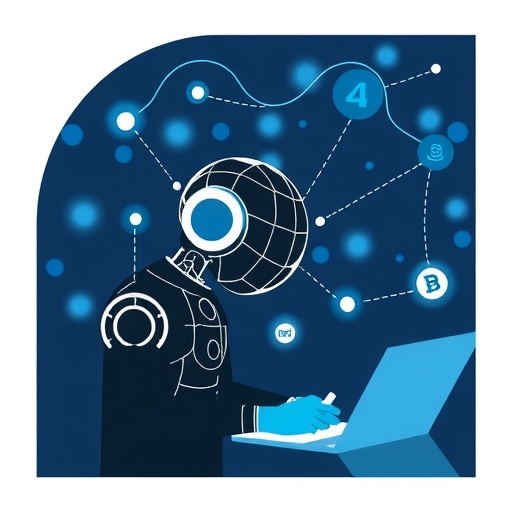In a landmark multicenter quality improvement study published recently in JAMA Network Open, researchers have demonstrated the transformative impact of an ambient artificial intelligence (AI) scribe platform on clinical practice. The study reveals that integrating AI-driven documentation tools in ambulatory settings can significantly alleviate multiple burdens that clinicians face daily, including burnout and cognitive overload. By automating and streamlining the documentation process, this technology enables physicians to reclaim valuable time, purportedly translating into enhanced patient engagement and more efficient healthcare delivery.
Burnout among clinicians is a pervasive challenge, with administrative tasks such as documentation often cited as primary contributors. The novel ambient AI scribe platform evaluated in this study captures and transcribes clinical encounters in real time without clinician intervention, thereby drastically reducing the cognitive task load that typically accompanies manual note-taking. The AI system’s natural language processing capabilities allow it to accurately parse complex medical dialogues, extracting relevant clinical data while minimizing errors commonly associated with human transcription.
Study participants across multiple clinical centers reported a marked decrease in the hours devoted to documentation after adopting the AI scribe. This reduction in time was not trivial; it significantly lessened healthcare providers’ workload, facilitating a shift in focus back to direct patient care. Such improvements have meaningful implications, potentially diminishing the emotional exhaustion component of burnout syndrome and fostering improved professional satisfaction and well-being among clinicians.
Beyond the individual clinician’s benefit, the implementation of AI scribes bears the promise of systemic advantages. The study found that healthcare professionals perceived this technology as a tool to broaden patient access to care. By decreasing documentation burden, appointment times could feasibly be shortened or schedules optimized, letting healthcare facilities see more patients without compromising care quality. This scalability becomes increasingly critical as patient demand continues to rise globally.
The AI platform’s design incorporates state-of-the-art machine learning algorithms that continuously improve through iterative training on clinical conversations and documentation patterns. Such adaptive learning ensures that the system remains current with evolving medical terminologies and standards, potentially improving its accuracy and utility over time. Moreover, the ambient nature of the AI scribe allows for unobtrusive integration into clinical workflows, minimizing disruptions and resistance from healthcare staff.
Another compelling finding relates to the qualitative impact on patient-clinician interactions. Clinicians utilizing the AI scribe reported heightened ability to concentrate on patient cues and concerns rather than being distracted by note-taking. This cognitive shift not only improves the therapeutic relationship but may also enhance diagnostic accuracy by allowing providers to gather subtle clinical information that might otherwise be overlooked.
Cognitive task load, a measurement of mental demand and effort, was significantly reduced according to standardized assessments in this study. This reduction implies that clinicians experienced less mental fatigue during and after clinical shifts, positioning the AI scribe as a valuable tool not only for workflow efficiency but also for maintaining clinician mental health. Given that cognitive overload is a known risk factor for medical errors, the AI’s potential to improve patient safety is substantial.
From a technical standpoint, this AI solution utilizes ambient microphones coupled with advanced speech recognition and contextual understanding to create a seamless capture environment. Unlike traditional scribes or electronic medical record (EMR) systems requiring manual input, the AI system operates passively, capturing the entirety of the clinical dialogue. This feature ensures comprehensive data collection while allowing clinicians to remain physically and mentally present with their patients.
Importantly, this study also addresses concerns regarding data security and privacy, key factors for adoption of AI technologies in clinical settings. The platform incorporates end-to-end encryption and strict compliance with healthcare information regulations such as HIPAA. Data are processed in secure, isolated environments, and patient information is anonymized where appropriate, safeguarding sensitive health details while enabling analytic capabilities.
The multi-institutional nature of the study enhances the generalizability of its findings. By assessing the AI scribe across diverse ambulatory environments, the research encapsulates variabilities in clinical specialties, patient populations, and workflow structures. Such broad applicability suggests that the benefits observed could be expected across a wide range of healthcare settings, from urban clinics to rural practices.
While the results are promising, the researchers emphasize the necessity for further longitudinal studies to evaluate the long-term impacts on clinical outcomes, cost-effectiveness, and broader health system integration. Additionally, user experience studies are recommended to optimize the interface and functionality, ensuring that the AI tools evolve in harmony with clinician needs and technological advancements.
This research represents a pivotal step toward harnessing artificial intelligence to address some of the most entrenched challenges in healthcare delivery. By effectively reducing documentation burdens and cognitive stress, ambient AI scribes hold the potential to revolutionize clinical workflows, improve practitioner well-being, and ultimately enhance patient care quality and accessibility.
The corresponding author of the study, Dr. Kristine D. Olson of Yale University, can be contacted for further details and data inquiries. This publication signals a new frontier in medical informatics where AI technologies are not just adjuncts but integral partners in clinical practice, paving the way for smarter, more humane healthcare systems.
Subject of Research: Ambient Artificial Intelligence Scribe Platforms for Reducing Clinician Burnout and Cognitive Task Load in Ambulatory Care
Article Title: [Not provided in the source]
News Publication Date: [Not provided in the source]
Web References: [DOI: 10.1001/jamanetworkopen.2025.34976]
Keywords: Artificial intelligence, cognition, professional development, stress management, emergency medicine, patient monitoring
Tags: administrative burden in healthcareAI scribe technologyambient artificial intelligenceautomation in clinical practicecognitive overload in healthcare professionalsefficiency in healthcare deliveryhealthcare provider workload reductionimproving patient engagementmulticenter quality improvement studynatural language processing in medicinereal-time clinical documentationreducing clinician burnout





